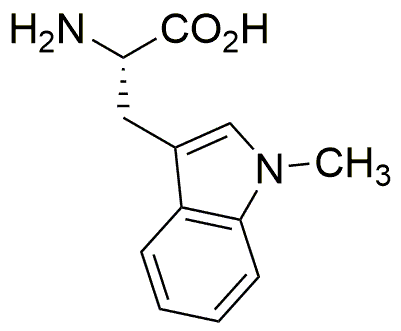1-Methyl-L-tryptophan is widely utilized in research focused on:
- Pharmaceutical Development: This compound is explored for its potential in developing new antidepressants and anxiolytics, offering alternatives with fewer side effects compared to traditional medications.
- Neuroscience Research: It plays a significant role in studies related to serotonin metabolism, helping researchers understand mood regulation and the effects of tryptophan on brain function.
- Cancer Research: Investigations into its immunomodulatory properties are ongoing, with potential applications in enhancing immune responses against tumors, providing a novel approach to cancer therapy.
- Dietary Supplements: This compound is being studied for its use in supplements aimed at improving sleep quality and reducing stress, appealing to health-conscious consumers looking for natural solutions.
- Animal Nutrition: It is also evaluated for its benefits in animal feed, particularly in enhancing the growth and health of livestock, which can lead to improved productivity in the agricultural sector.
General Information
Properties
Safety and Regulations
Applications
1-Methyl-L-tryptophan is widely utilized in research focused on:
- Pharmaceutical Development: This compound is explored for its potential in developing new antidepressants and anxiolytics, offering alternatives with fewer side effects compared to traditional medications.
- Neuroscience Research: It plays a significant role in studies related to serotonin metabolism, helping researchers understand mood regulation and the effects of tryptophan on brain function.
- Cancer Research: Investigations into its immunomodulatory properties are ongoing, with potential applications in enhancing immune responses against tumors, providing a novel approach to cancer therapy.
- Dietary Supplements: This compound is being studied for its use in supplements aimed at improving sleep quality and reducing stress, appealing to health-conscious consumers looking for natural solutions.
- Animal Nutrition: It is also evaluated for its benefits in animal feed, particularly in enhancing the growth and health of livestock, which can lead to improved productivity in the agricultural sector.
Documents
Safety Data Sheets (SDS)
The SDS provides comprehensive safety information on handling, storage, and disposal of the product.
Product Specification (PS)
The PS provides a comprehensive breakdown of the product’s properties, including chemical composition, physical state, purity, and storage requirements. It also details acceptable quality ranges and the product's intended applications.
Certificates of Analysis (COA)
Search for Certificates of Analysis (COA) by entering the products Lot Number. Lot and Batch Numbers can be found on a product’s label following the words ‘Lot’ or ‘Batch’.
Numéro de catalogue
Numéro de lot/série
Certificates Of Origin (COO)
This COO confirms the country where the product was manufactured, and also details the materials and components used in it and whether it is derived from natural, synthetic, or other specific sources. This certificate may be required for customs, trade, and regulatory compliance.
Numéro de catalogue
Numéro de lot/série
Safety Data Sheets (SDS)
The SDS provides comprehensive safety information on handling, storage, and disposal of the product.
DownloadProduct Specification (PS)
The PS provides a comprehensive breakdown of the product’s properties, including chemical composition, physical state, purity, and storage requirements. It also details acceptable quality ranges and the product's intended applications.
DownloadCertificates of Analysis (COA)
Search for Certificates of Analysis (COA) by entering the products Lot Number. Lot and Batch Numbers can be found on a product’s label following the words ‘Lot’ or ‘Batch’.
Numéro de catalogue
Numéro de lot/série
Certificates Of Origin (COO)
This COO confirms the country where the product was manufactured, and also details the materials and components used in it and whether it is derived from natural, synthetic, or other specific sources. This certificate may be required for customs, trade, and regulatory compliance.


